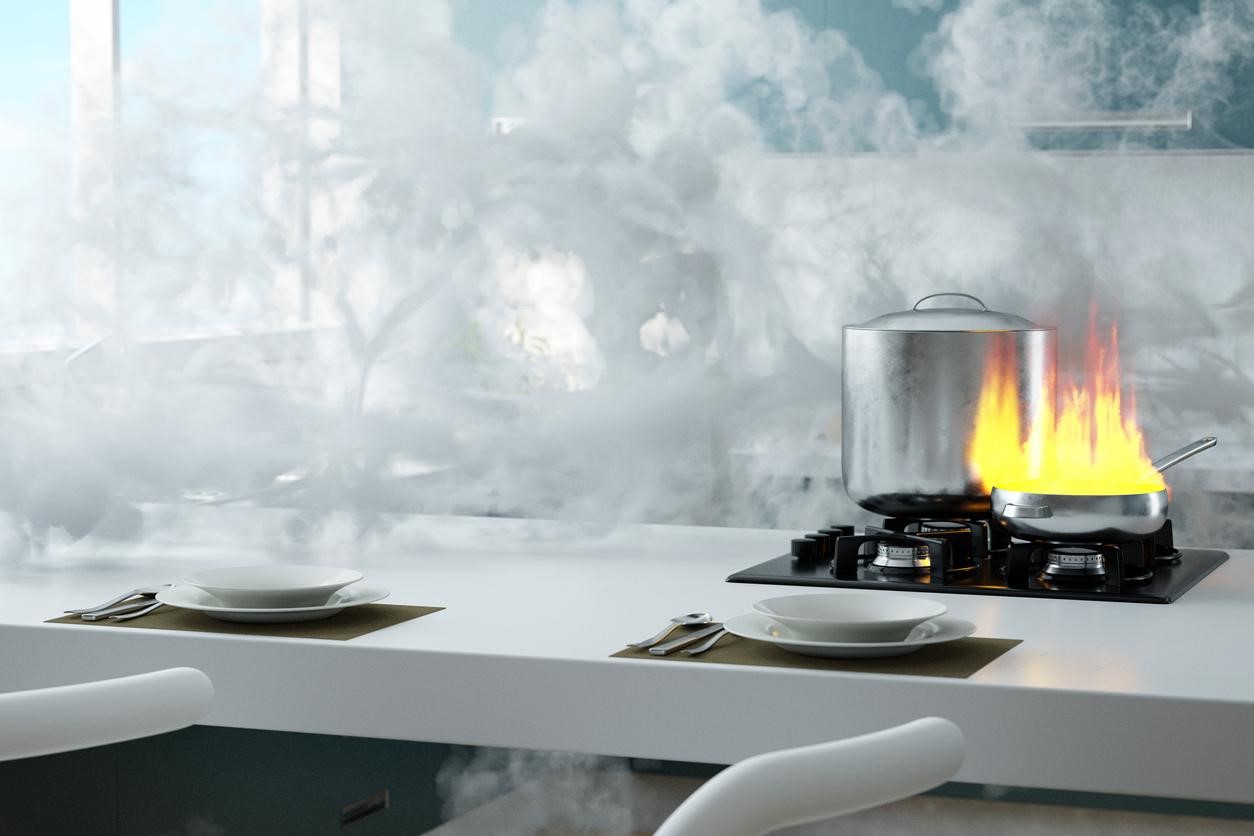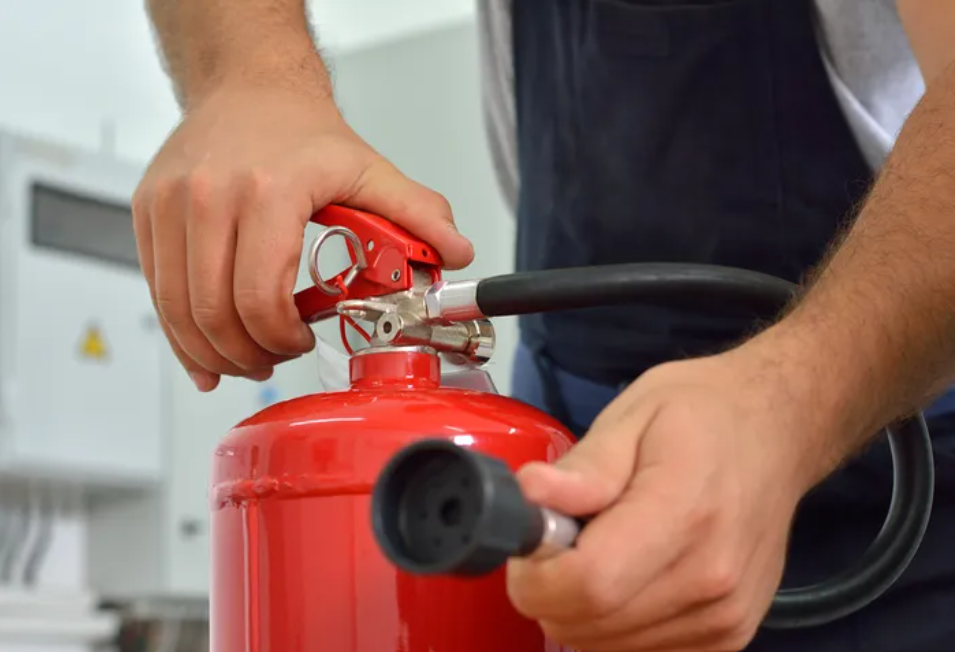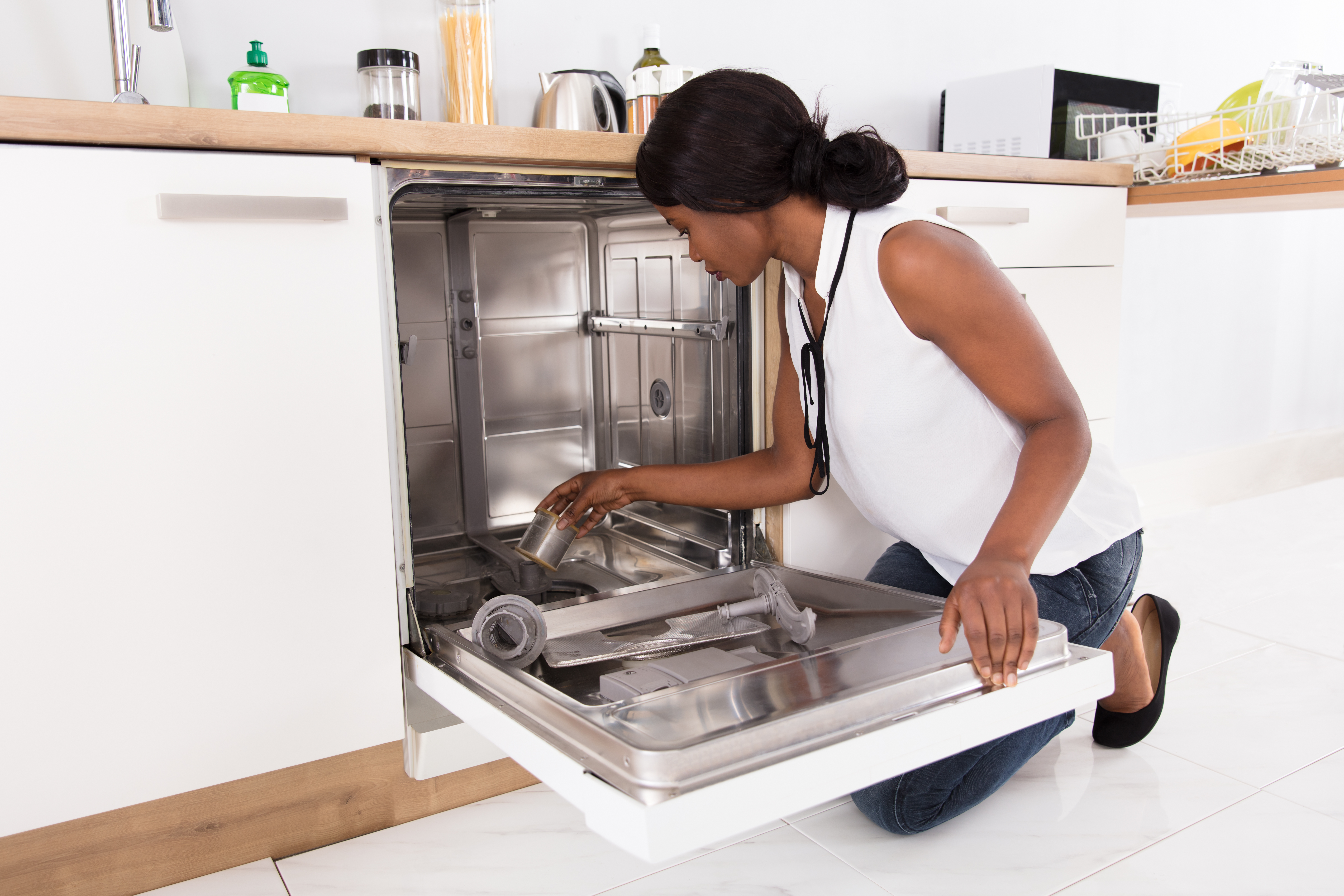
At a Glance:
What To Do During an Appliance Hazard
How to Prevent Appliance Hazards
There are two types of people in this world: Those who can be left alone with power tools, and those who shouldn’t.
No matter what type of person you are though, we all could use a refresher in appliance safety. Whether you are in the market for new appliances or not, it’s always good to keep safety in mind, especially with all the things that can go wrong in a kitchen. Let’s take a look at a few safety hazards to be mindful of, and remember to put those hard hats on!
Explore Appliances at Slager's
Dealing with the aftermath of an appliance hazard? Explore new appliances from top brands like Cafe, GE, Fisher & Paykel, and more at Slager Appliances!
Discover Appliances5 Appliance Hazards
In order to keep you and your family safe, we've compiled a list of five common appliance hazards to look out for and how to avoid them.
1. Fire In the Fridge!
Now, you might be wondering how in the world a fridge, which keeps things cold and frozen, can possibly be a fire hazard? Well, wonder no more because we’ve got the answers as to why the coldest place in your kitchen could end up burning in a blaze.
There are a few things you need to keep an eye on fridge-wise. First, you want to make sure to keep your fridge area clean – make sure to sweep often underneath and behind it to keep dust from building up around the fridge’s electronics.
Second, you also want to keep an eye on the fridge cord and make sure it doesn’t get frayed or leave part of the wire exposed – that’s just an electrical fire waiting to happen. For example, Robbie thought it was a smart idea to try to move the fridge on his own one day – why, nobody knows – and rolled the fridge over the cord, which damaged it. That’s a big risk for electric fires, so make sure to, as always, learn from his mistakes.
2. Sometimes Drier Is Better
We get it – sometimes you are moving a mile a minute when you are cooking and working in the kitchen. These are busy times, and multitasking is a great way to get a lot done at once, but, it’s also important to keep safety in mind. Going right from washing the dishes to plugging in the blender – hypothetically of course, not that anybody would actually do that, ROBBIE – is dangerous, and any time you are using something electric you want to make sure that your hands are dry. And no, not air dry, Robbie, actually dry.
3. Why You Shouldn’t Microwave Metal
On that “life is always busy” note, sometimes there just isn’t time in the day to cook. That’s where the handy dandy microwave comes in.
But, please please please, keep certain things out of the microwave. Like metal. That means utensils should NOT go in the microwave, even if you want to warm up your spoon before scooping ice cream. It’s really dangerous and can lead to a fire, not to mention explosions! Just don’t do it.
Action figures are also not microwave approved, for the record, Robbie. Nice try, though.
4. Close, But No Cigar
When you have a lot of small kitchen appliances it can be hard finding counter space for all of them, especially if you are constantly using all of them to put meals together. Counters always seem to be one appliance-length short of whatever you need!

There’s one thing you want to keep in mind when you are placing appliances, though. Your toaster? Yeah, the square little box that makes toast? You don’t want it anywhere near your stove or oven.
Why? Well, even though toasters get hot on the inside, if they are too close to over sources of heat, they can get damaged on the outside. Only you can prevent forest...we mean, kitchen fires.
5. Plug ‘N’ Play
When it comes to appliances and outlets, one can never be too careful. There are a lot of things you should keep in mind – such as making sure your outlets are grounded and that you aren’t using extension cords to plug appliances into the wall. Appliances are powerful things, and should be treated as such!
→ Learn more: Small Appliances, Big Impact: A Guide to Compact Appliances
What To Do During an Appliance Hazard

When faced with an appliance hazard, it is crucial to prioritize safety and take immediate action to mitigate any potential risks. Here are some essential steps to follow:
-
Assess the situation: Quickly evaluate the severity of the hazard. Is there an immediate danger to life or property? Can you identify the source of the problem, such as a faulty wire, a leaking gas connection, or smoke emanating from the appliance?
-
Evacuate if necessary: If the hazard poses an immediate threat, evacuate the area or the building. Ensure everyone's safety by calmly directing them to a designated meeting point away from the affected area.
-
Cut off the power or fuel supply: If it's safe to do so, disconnect the appliance from its power source or shut off the gas supply. This step will help prevent further damage or potential accidents. However, exercise caution and avoid touching any exposed wires or gas lines.
-
Call emergency services: Dial the emergency number in your region, such as 911, to report the hazard. Provide clear and concise information about the situation, including the nature of the hazard, your location, and any immediate dangers.
-
Inform others and warn nearby individuals: If possible, notify other people in the vicinity about the appliance hazard to prevent them from inadvertently coming into harm's way. Place warning signs or verbally alert others to stay clear of the area until it is deemed safe.
-
Seek professional assistance: Contact a qualified appliance repair service or a licensed technician to inspect and repair the appliance. Attempting to fix the issue yourself might exacerbate the hazard or lead to personal injury.
-
Document the incident: Take photographs or videos of the hazard and any related damages. This documentation will be useful for insurance claims or legal purposes, if necessary.
Remember, personal safety should always be the top priority in appliance hazards. Following these steps will help you minimize risks, protect lives, and ensure a prompt resolution.
How to Prevent Appliance Hazards

Preventing appliance hazards is crucial for ensuring the safety of your home and loved ones. By following a few key practices, you can significantly reduce the risk of accidents and potential damage. Here are some essential steps to help you prevent appliance hazards:
➤ Regular maintenance: Perform regular maintenance on your appliances to keep them in optimal working condition. Follow the manufacturer's guidelines for cleaning, servicing, and inspecting your appliances. Pay attention to any signs of wear and tear, loose connections, or unusual noises. Address any issues promptly to prevent them from escalating into hazards.
➤ Read and follow instructions: Familiarize yourself with the operating instructions and safety guidelines provided by the manufacturer for each appliance. Follow the recommended usage procedures, including load capacities, voltage requirements, and maintenance instructions. Ignoring these instructions can lead to accidents and potential hazards.
➤ Avoid overloading electrical outlets: Overloading electrical outlets or extension cords can lead to overheating and electrical fires. Spread out your appliances across multiple outlets and never exceed the recommended wattage or load capacity. If you find that you frequently need more outlets, consider consulting an electrician to install additional ones.
➤ Proper storage and ventilation: Some appliances, such as refrigerators, dryers, and water heaters, require proper ventilation and adequate space for operation. Ensure that these appliances have enough clearance around them to prevent overheating. Keep flammable materials away from heat sources, such as stoves and ovens, to minimize the risk of fire.
➤ Install smoke detectors and carbon monoxide alarms: Install smoke detectors and carbon monoxide alarms in appropriate areas of your home, particularly near appliances such as furnaces, water heaters, and fireplaces. Regularly test and maintain these devices to ensure they are functioning correctly.
By following these preventive measures, you can significantly reduce the risk of appliance hazards and promote a safer living environment for you and your family. Regular maintenance, proper usage, and staying informed are key elements in ensuring appliance safety.
→ Learn more: How to Clean Your Major Appliances
Well, we don’t know about you, but we feel a lot better now that we’ve refreshed on some basic appliance safety tips. Of course, you can’t have appliance tips to remember without appliances themselves – and that’s another thing we can help with! We’ve been providing families in this area with top quality appliances for years, and that’s what we love to do!
FAQ
What causes appliance fires?
Appliance fires can be caused by a variety of factors, including electrical malfunctions, overheating, improper use or maintenance, mechanical failures, and manufacturing defects. Common causes include short circuits, frayed wires, excessive dust accumulation, flammable materials near heat sources, and misuse of appliances.
Can a refrigerator emit toxic fumes?
Under normal operating conditions, a refrigerator should not emit toxic fumes. However, in rare cases, certain refrigerants used in older fridge models, such as chlorofluorocarbons (CFCs) or hydrochlorofluorocarbons (HCFCs), can be harmful if leaked. Modern refrigerators typically use more environmentally friendly refrigerants, such as hydrofluorocarbons (HFCs), which are safer.
What is an example of an electrical hazard in a home?
An example of an electrical hazard in a home is exposed wiring. This can occur when electrical wires are damaged, stripped, or not properly enclosed. Exposed wires increase the risk of electric shocks, short circuits, and electrical fires. It is important to address exposed wiring promptly by consulting a licensed electrician.
What are the electrical hazards?
Electrical hazards refer to potential dangers associated with electrical systems and appliances. These hazards include electrical shocks, fires, frayed wires, and short circuits.
Why Trust Slager Appliances?
Founded over 70 years ago, Slager Appliances is a family-owned, independent appliance retailer based out of Iowa City, IA. Slager has competitive prices and industry knowledge in delivering and installing all major appliance brands. Large enough to offer competitive pricing yet small enough to continue offering the “white glove” service we pride ourselves on, our focus is always on the customer experience — from the first step into a showroom to the purchase transaction to well after your new appliance has been installed.
Whether you need to replace an old appliance, or if you’re remodeling and need an entire kitchen full of new brand-name products we are with you all the way. We will work with you to find a product that fits your needs, budget, and lifestyle.
Shop Appliances at Slager Appliances
Don’t put off until tomorrow what you can do today, and shop appliances online at Slager Appliances. Our friendly experts are always happy to help you find safe and hazard-reducing appliances — whether you call us at 319-337-3833, email us, or use our online chat feature. Better yet, stop by any of our Slager Appliances in Iowa City, IA. Visit us today!
→ Learn more: Best Appliance Store in Iowa City: Slager Appliance